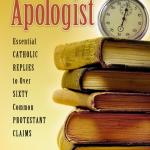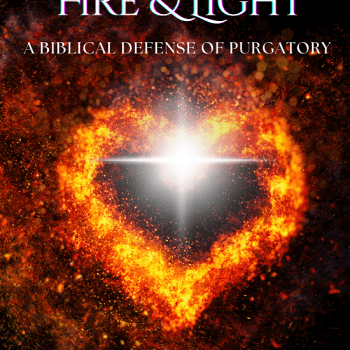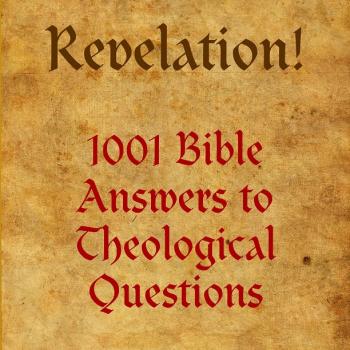
It seems that for some inexplicable reason (who knows what?), three of my fellow Catholic writers at Patheos (and heaven knows how many more kindred spirits that they are gabbing with) have gotten this ridiculous idea in their heads that I somehow believe in the contrary of the idea expressed in the title of this article.
They know better. As a matter of fact, I have never ever believed such a ludicrous notion, and I can easily prove it: what with my more than 2400 posts on Patheos (and Internet Archive, if it comes to that).
I’ve written so much just on the general topic of Catholic apologetics (what it is, misconceptions concerning it, the strong biblical basis, etc.), that I had to search a bit myself, but I knew the sort of statements presented below were there, because I know what I believe. Here, for example, are excerpts from a paper of mine dated 19 January 2010, called Dialogue on Reason & Faith, w Theological Liberal. In it, I write, plain as day:
[A]ny apologist who thinks reason is the sum total of the Catholic faith, or even anywhere near its most important aspect, has no business being an apologist at all, as he is supremely ignorant of what Christianity (of any stripe) is. It is that fallacy that has led to the downfall of some who have tried their hand at apologetics: excessive rationalism, which is extreme and a falsehood.
Apologists deal with the issue of reason and faith, which is an important one. That’s what we do. But just because it is our area or field, it doesn’t follow that we are or should be reducing the faith to those things. Oftentimes, this is a caricature or stereotype imposed upon apologists, and sometimes a small number of nitwits on the Internet, claiming to do apologetics, unfortunately exhibit it. . . .
In my own case (speaking of the place of reason in faith), I converted to both evangelicalism (1977) and Catholicism (1990) primarily because of the impulse of moral issues, that were highly intuitive and subjective and felt in the heart and spirit, and not solely “rationalistic” or “logical” or even primarily so.
Later I defended those things from more objective reason, assuredly, but they themselves at the time they moved my will and spirit, were more intuitive or mystical or experiential in nature.
There is a balance here, and those who perhaps didn’t realize that, and got into apologetics anyway, were placing themselves in spiritual danger, I submit. . . .
It is excessive rationalism that leads to a lack of faith, as we see in historic theological liberals, or a guy like the intellectually brilliant historian Joseph Dollinger in 1870, when he rejected papal infallibility and wound up excommunicated. He couldn’t grasp it because he wasn’t viewing it with the eye of faith and reason. He looked with reason alone: i.e., a post-Enlightenment over-rationalism. . . . He was in danger of reducing Catholicism to mere historiography at that particular point of his thought. This is what Cardinal Newman severely critiqued. . . .
But that is never an acceptable option for a Christian. We all must exercise faith, and that can never be proven with an airtight certainty. At best we can try to show that our faith is not inconsistent with reason and fact. . . . It is the lack of faith which is the problem, because now the equation is out of balance. Christianity is not merely a philosophy (hence subject to all the epistemological requirements of same); it is a religion. . . .
Then questions of plausibility and comparative systems come into play and stuff like Cardinal Newman’s “Illative Sense” or the positivist-smashing philosophical speculations of Michael Polanyi, or the sorts of warrant for belief that Reformed philosopher Alvin Plantinga discusses with great insight today.
If someone wants to be on the cutting edge of the legitimate relationship of faith and reason, I highly recommend reading folks like these. It will at least be challenging and interesting even if not persuasive in every case. . . .
It is a matter of faith supported by reason. Faith is a supernatural thing. It can’t be reduced to logic and reason. It transcends those things. I became a Catholic and thus submitted myself to accept all that the Church teaches, through faith: but a faith exercised because I saw a great deal of cumulative evidence that supports this faith: particularly of he kind that is typified by Newman’s theory of development, and an overall interpretive framework for the Bible that made eminent sense and was superior to alternatives. . . .
My concern was the de-emphasis of faith and the excessive emphasis on reason, in the hyper-rationalistic sense. Reason has to be put in its proper place. It’s because it is placed too high in the scheme of things, that folks can sometimes become disenchanted with apologetics: precisely because they didn’t keep the proper balance of reason, in league with other factors like experience, intuition, mysticism, faith, conscience, etc.
Supernatural faith, by definition, is a gift of God. Whoever receives it usually does not understand every jot and tittle of its rationale and justification. It is not the equivalent of an airtight conclusion drawn from a syllogism or other straightforward logical processes. Later on, a person may build up an intellectual apparatus by which they can defend the belief that they initially received by this faith, but to say that faith comes as a result of our profound reasoning efforts, is putting the cart before the horse and a fundamentally flawed analysis of the dynamics involved.
In another paper, dated 9-8-08 (“Why Are Catholics So Legalistic and Rationalistic?”), I wrote:
First of all, anyone who is familiar with St. Thomas [Aquinas] knows that he was not just about minute distinctions and legalism and what-not. He was also quite a mystic and a “devotional” person (especially later in his life). He could combine both things and not see a contradiction. It’s the Catholic “both/and” outlook.
Secondly, the same Church that so highly exalts St. Thomas has an extraordinary mystical tradition, with saints like St. Francis, St. Catherine, St. Teresa of Avila, St. Therese, St. John of the Cross, etc. We don’t feel the need to dichotomize these two strains against each other. The Catholic Church is large enough for both; it rejoices in both. We have both great thinkers and logical analysis and great mystics and mystical reflection (sometimes in the same person).
I’ve done books along both these lines myself: The Quotable Summa Theologica and also Quotable Catholic Mystics and Contemplatives. I can’t be put in a silly “one thing only” box. I love mysticism, religious experience (I defend the Catholic charismatic movement). I believe in healing and all of the spiritual gifts. I’m a well-rounded Catholic, and the very opposite of this caricature and stereotype that these three and who knows how many more, have constructed from whole cloth. I’m a nature mystic and an amateur musician. I experienced the longing for God through nature and music, that has now been developed into one of the theistic arguments, by C. S. Lewis, Peter Kreeft, and others.
I also am very concerned about understanding and living out Catholic social teaching, as can be seen in my very extensive writings on political and moral and social issues, and especially the issue of paramount importance in our time: pro-life and building a culture of life. One particular paper that exhibits the passion I have in this respect (and the individual nature of many of my opinions that go against the stereotype of what a conservative is), is “THIS ‘Conservative’ is VERY Passionate About Social Justice.” But of course, those who are of a more liberal or leftist bent very often can’t comprehend that anyone to the right of them can be just as compassionate and caring (or more so) about people as they are. Knee-jerk prejudice against conservatives is built into their DNA, or so it seems.
A paper of mine from 9-7-05 illustrates how I view the process of conversion to Catholicism, or being convinced of same, and how I think it is anything but an apologetics-only, solely rationalistic phenomenon:
A big part of my objection to many Protestant explanations of conversions to Catholicism, is my intense dislike for single causal explanations of almost anything. I find that intuitively false: almost from common sense. This is one valuable thing I received from my studies in sociology and psychology.
Reality is always more complex than one simple explanation. Conversion is all the more so. It’s an extraordinarily complex and painful process. . .
We are human beings in communities, with experiences, emotions, stories, influences, psychological, personal, familial, temperamental, and many other factors all having an effect on both our beliefs and actions.
Conversion stories provide a sort of moral support or what I have called a “plausibility structure” for the belief-system that was thus adopted. This gets back to the notion: “human beings don’t live in a rational, logically airtight vacuum”. Conversion stories provide indirect rationales for viewpoints because of the nature of the process itself and those who undertake it. . . .
Plausibility is a fascinating subject in its own right. Why do people find one thing persuasive and another not? What factors into that? Why do two people see the same set of data and one feels one way and the other the total opposite? Conversion stories to Catholicism mainly make Catholicism a more plausible, even (in hard cases) “thinkable” option.
There are a host of factors leading to conversion. There are mystical and intuitive reasons, there is the moral argument (which has even been developed by philosophers in great detail, but need not be philosophical in a given individual), there is experiential and miraculous evidence (philosopher William Alston has developed this line in great depth), there are pragmatic and psychological and relevant emotional and highly personal considerations.
One might, for example, read of accounts of miracles at Lourdes and Fatima, or about the Incorruptibles, or people being raised from the dead or healed in extraordinary ways, about the bi-location of saints like Padre Pio, or exorcisms, etc. They may witness some miracle themselves or be so moved by an act of love by some Catholic that this convinces them that Catholicism is the True Way.
This is eyewitness, legal-type testimony similar to that found in the Bible accounts of miracles. One may read of these and become convinced that Catholicism is true. Certainly the early Church thought miracles were highly important in their testimony and evangelization. They highlighted the Resurrection, and Jesus Himself came back to let Thomas put his hand in His wounds, etc.
In my post, Christian Devotion to Jesus Explained to Atheists & Agnostics (10-10-15), I expressed how belief is exponentially more complex than merely reason and apologetics:
We see the beauty and profundity and wisdom in Jesus and it touches our souls. His words move us like no other words. We receive them as self-evidently true, and by God’s grace we believe in Him, in faith. And it transforms our lives in doing so, as it has mine and millions of others.
You can mock us, say we’re gullible and stupid and infantile and anti-scientific, and all the rest (all lies in terms of being generally true), and be skeptical all you like, but when a person’s life is changed for the better, and they have found a peace and joy that surpasses anything else in this life, they’re gonna follow that path, no matter how difficult it may be at times.
It’s like if someone truly falls in love with another person and has found that happiness, and all the people around them try to convince them that they don’t really feel better; that they are not in love at all. It’s just a big illusion. It’s like the old Simon and Garfunkel song, I Am a Rock, where the singer cynically believes that love only causes pain, so he removes himself from it and thinks he is “happy” in so doing. Some of the lyrics might even be thought to apply to how some atheists reject God and the joy and peace therein: that comes from knowing Him and letting Him transform one’s life.
Do you think the young lovers care about all that? Will they give up on their newfound love because others who don’t and can’t experience their love deny that it exists?
No, of course not. They won’t even do it if their best friends or parents advise them to do so. That’s how we are with atheists and skeptics. They’re not in our skins. They can’t deny the validity of our experiences with the waving of hands and the shaking of heads, smirks and rolling eyes, and all the supposed “knowing” and allegedly intellectually superior garden-variety objections. It just doesn’t work.
I have sometimes compared the feeling of being in love (especially unforgettable young love) with belief in God. Asked why we believe in God, Christians are often at a loss at such an incredulous question, because it amounts to a million reasons and yet one overall reason (it’s the truth and reality of things). We feel like a mosquito on a beach on a sunny day: we have no idea where to go first!
Just as a happily married husband or wife can’t readily answer why (or all the reasons why) they love about their spouse; why they chose to marry them; so it is with our allegiance to God and being His disciple. Some things ultimately go beyond words, and that’s okay. Many of life’s finest and best moments are nonverbal. Words aren’t always required. Explanations certainly aren’t always necessary for something to be real and valid. . . .
And in the paper, Dialogue with an Agnostic on God as a “Properly Basic Belief” (10-5-15), I opined:
When atheists become theists or Christians, it’s almost always based on something other than classic theistic arguments, just as is the case with anyone who converts to Christianity as a result of any sort of sincere, serious reflection: reasons beyond happenstance or wanting to marry a girl or guy, etc. This was true in my own case as well.
My evangelical conversion to Christ in 1977 at age 18 was based on intuitive, moral, and “nature mysticism” considerations, including being deeply moved by an excellent dramatic portrayal of the Gospels: Jesus of Nazareth. And it proceeded in another sense from existential (virtually nihilistic) despair: my six-month clinical depression. My Catholic conversion in 1990 was based on a growing admiration of Catholic moral theology and historical study of development of doctrine and the 16th century religious conflicts.
Neither had anything to do with being convinced by some rational argument in favor of God’s existence [or in favor of the uniqueness and “fullness” of the Catholic Church], though reason was involved at a very deep level: especially in my Catholic conversion. No one cares about the arguments for God except a few philosophers and apologists who love to speculate about such things, and mostly talk to each other up in ivory towers or the back pews of churches after everyone else leaves.
That’s why it makes up very little of my overall work in Christian apologetics that I have been doing for 34 years now. It’s not how probably 99% of people become convinced of God’s existence or the truth claims of Christianity. They usually do because of an intuitive moral sense or some sort of personal experience: either of going through despair (as I did) or finding true peace and happiness within Christianity that they had never possessed before.
I could find much more along these lines, but what I have already found suffices to disabuse anyone who is spreading these absurd notions about what I supposedly believe and teach in my writing. I know, for example, that I have argued (but I can’t find it), that in many cases of nonbelievers, apologetics (or any sort of argument at all) will accomplish little or nothing, and that profound acts of love and service (preferably in person) will be the only things that will cause someone to seriously consider Catholicism. And I expressed my wish to be able to do that with many people. But I can’t (at least not in person), because they live far away from me.
***
Photo credit: parkeyparker (1-30-10): Converging lines created by wooden planks on a soundproofed wall. [Flickr / CC BY 2.0 license]
***













